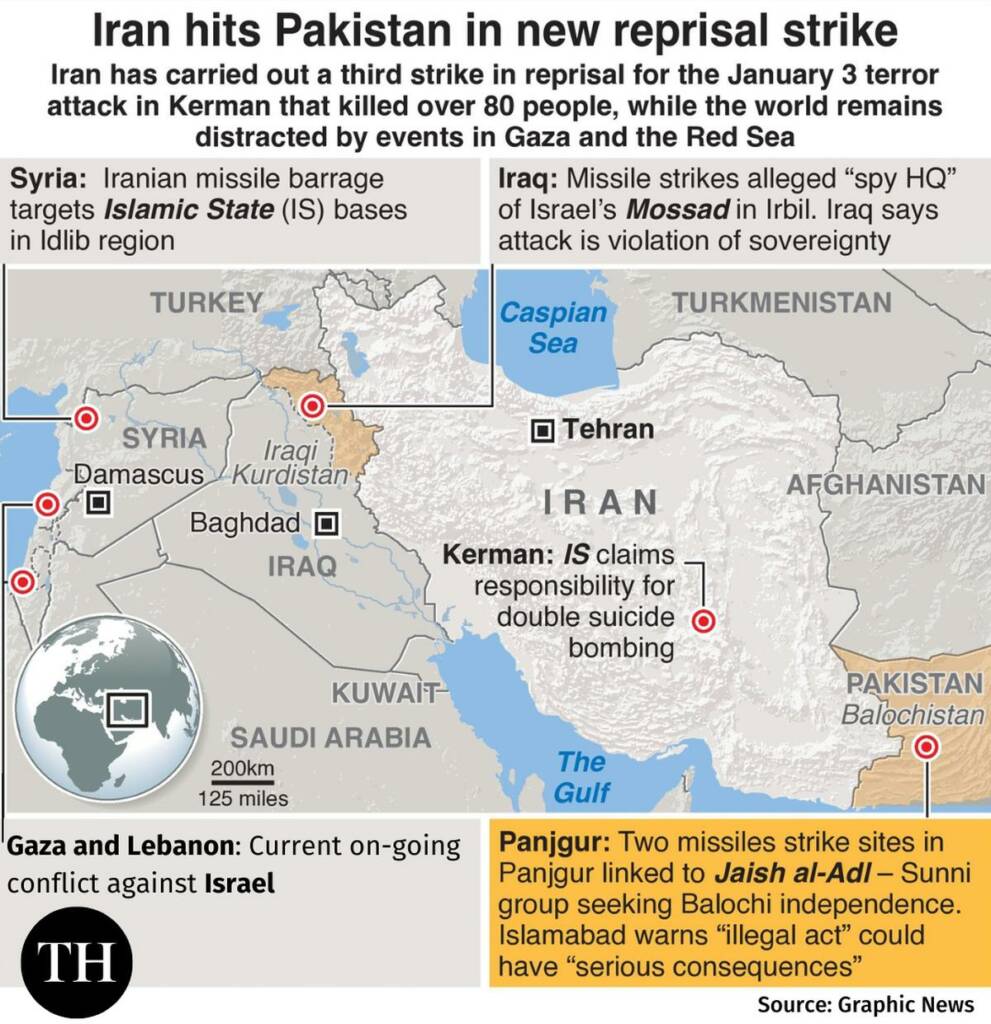The recent escalation of hostilities between Pakistan and Iran is marked by reciprocal strikes on each other’s territories. The shared border, spanning approximately 900 kilometers and encompassing Pakistan’s Balochistan province and Iran’s Sistan and Baluchestan province, has become a focal point. Notably, both nations have historically engaged in counterinsurgency operations against militants in the Baloch region. However, the current situation, involving direct attacks on each other’s soil, is a departure from the norm.
This development takes place against the backdrop of broader tensions in the Middle East. The focus is particularly on Iran’s alliances and their activities vis-à-vis Israeli forces. This raises concern for stability in the region.
Join us on Telegram: https://t.me/tfiglobal
Iran initiated the hostilities by launching strikes on Pakistan’s Balochistan, asserting that the targets were Iranian terrorists. Unfortunately, this action led to civilian casualties. In response, Pakistan criticized the strike, deeming it a breach of international law and a strain on bilateral relations.
Iran initiated the hostilities by striking Balochistan? Is this a case of “The Blame Game,” where countries take turns accusing each other of starting the trouble? Who’s next in line to point fingers?
The focus of Iran’s offensive was the Jaish al-Adl militants, a separatist group operating on both sides of the border. This group advocates for the independence of Iran’s Sistan and Baluchestan region. The geographical scope of Jaish al-Adl’s activities underscores the complexities of the situation, as the group’s actions span the border, thereby contributing to the tensions between Iran and Pakistan.
In response to Iran’s initial strikes on Pakistan’s Balochistan, a Sunni-majority country, Pakistan, characterized by its Sunni majority, launched retaliatory precision strikes in Iran. Pakistan claimed to target separatist hideouts in this operation. The strikes conducted by Pakistan resulted in casualties, including both militants and civilians. Pakistan framed these actions as a response to Iran’s alleged harboring of separatists, indicating a tit-for-tat approach in the ongoing hostilities.
Read More: Did Biden just send American Finance Giants to somehow keep Ukraine running?
The reciprocal strikes between the two nations are embedded within a protracted struggle against border-based separatist groups. Both Pakistan and Iran have a history of contending with these groups, reflecting the enduring nature of the challenge in the region. The complexity of the situation is heightened by the religious contrast between Sunni-majority Pakistan and Shia-majority Iran, adding an additional layer to the dynamics at play in this long-standing struggle against border-based separatists.
Religious contrast, Sunni versus Shia – are they using theological differences as the plot twist in the ongoing events, or is it just another excuse for the age-old rivalry?
Recent events, such as an attack by Jaish al-Adl in Iran, have heightened existing tensions in the region. Iran’s proactive stance in the region is evident through its military actions, including strikes on targets in Iraq and Syria, as well as its involvement in conflicts in Lebanon and Yemen.
Experts posit that Iran’s actions may be driven by a strategic objective to assert regional dominance and counter American influence.The Baloch people, distributed across Pakistan, Afghanistan, and Iran, have a historical aspiration for independence, fueled in part by perceived exploitation of resources in their regions.
Jaish al-Adl, identified as a separatist group and a faction of the broader Jundallah, has been actively involved in targeting Iranian forces. The group’s activities are particularly against Iranian military entities.
The Baloch people’s quest for independence and the actions of separatist groups like Jaish al-Adl highlight the significance of ethnic and regional factors in the ongoing struggles within the countries where the Baloch reside.
The historical aspirations of the Baloch people for independence, fueled by perceived resource exploitation, raise significant concerns. How does the international community address such grievances?
The recent strikes between Pakistan and Iran have resulted in prompting Pakistan to recall its ambassador from Iran. This bilateral response underscores the severity of the situation and the strain on diplomatic relations between the two nations.
Read more: U.S. Steel: SOLD. The Red Flag for America’s Future
Internationally, responses to these developments have exhibited diversity. Calls for restraint have been prominent, reflecting a collective concern about the potential escalation of violence in the Middle East.
The recall of ambassadors and the international responses indicate the broader implications of the hostilities between Pakistan and Iran. Iran and Pakistan have communicated their shared intention to de-escalate, highlighting their fraternal relations despite the recent strikes. This mutual desire signals a recognition of the importance of diplomatic resolutions and a commitment to maintaining cordial ties between the two nations.
The current situation is delicate, posing a challenge for both Iran and Pakistan.
As Iran and Pakistan express a shared desire to de-escalate, the delicate nature of the situation remains a challenge. It prompts us to contemplate the potential outcomes of this complex scenario. Will diplomatic efforts prevail in defusing tensions, or will the region face further instability and escalation? The answer to this question will undoubtedly shape the trajectory of events in this troubled region.
